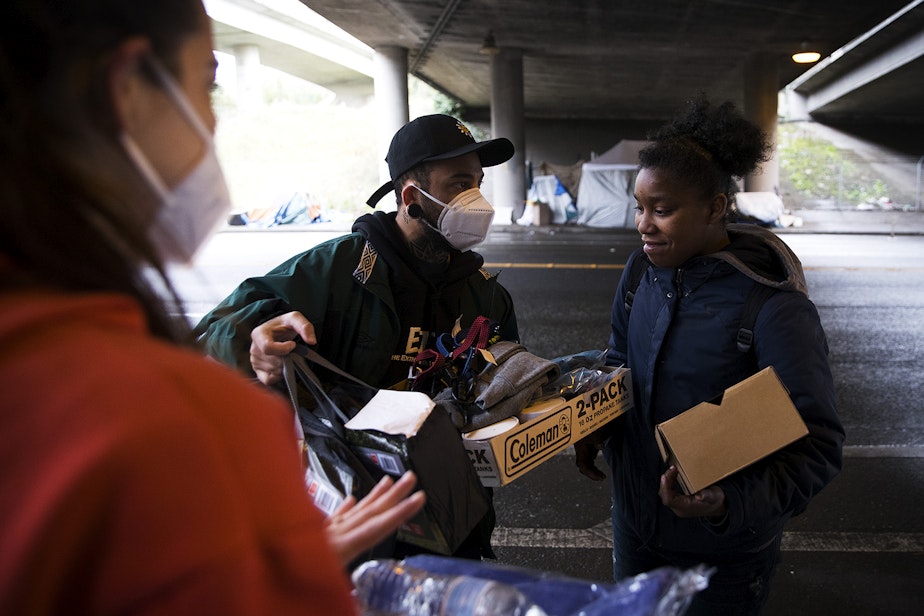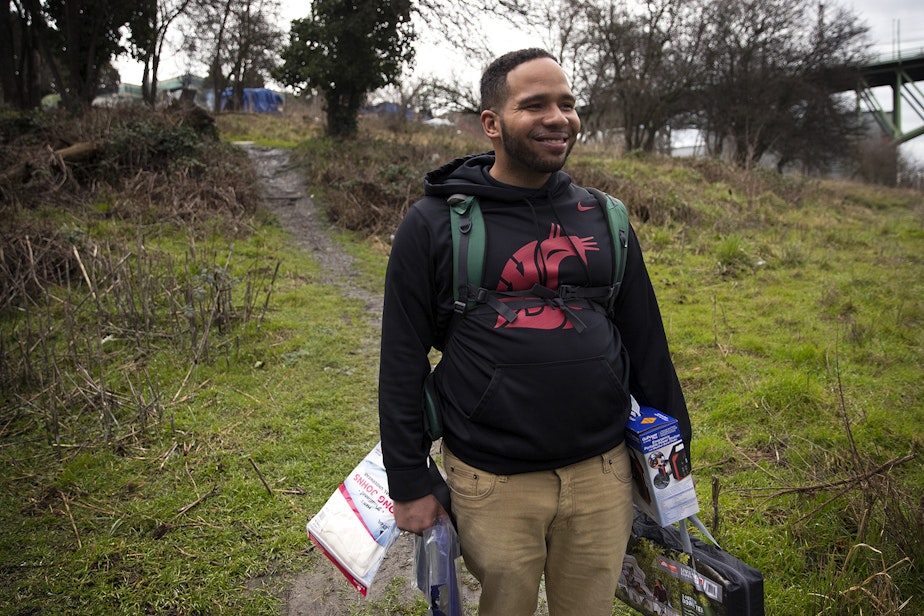In this 'city of abundance,' everyday Seattleites deliver donations to unhoused communities

A
t the top of 10th Avenue and Dearborn Street in Seattle’s Chinatown International District neighborhood sits an encampment. Rows of tents line the undeveloped patch of land, called Beacon Place. Apart from the ambient sound of cars zipping across an adjacent overpass, it’s a mostly quiet scene.
Joscelyn and Cass DuVani, a 26-year-old married couple, arrived on a rainy Friday afternoon with bags containing a medley of snacks, emergency blankets, and personal hygiene products, including toothpaste and tampons. They also brought fresh clothes, new shoes, and hot soup.
The DuVanis, wearing hiking boots to navigate a mudslide and discarded needles, made several trips between their small hatchback and the encampment to distribute the donations. As word spread that they had a car full of essentials, several people walked down from the hill to request items.
The DuVanis are part of an informal, local cooperative of Seattleites attempting to plug holes in a system that leaves thousands in the city without shelter or basic necessities. These efforts, referred to as mutual aid, are independent — they’re not tied to the city or any particular organization.
The couple was familiar with the residents of the Beacon Place encampment after surveying them the previous week about what they could use.
“We talked to everyone, and told them that we'd be bringing donations,” Joscelyn DuVani said. “We asked what their needs were and then we just kind of sourced those over the last week. And then yesterday, we came back by to remind everyone we'd be here today and take a few more last minute requests.”
Cass DuVani worked as a restaurant chef pre-Covid, but left to do part-time landscaping as a safer line of work during the pandemic. Joscelyn was laid off from her job as a bartender and remains unemployed. But soliciting, collecting, and distributing donations for King County’s unhoused communities has become a full-time job in its own right.
The DuVanis estimate they spend about 40 hours every week doing this work. They drive around the Seattle area in search of encampments to offer assistance, focusing resources on a different one each week. On average, they help between 25 to 30 people at a time during their weekly distributions.
The DuVanis began their efforts during the last holiday season, calling their operation Homies Helping Homies. The DuVanis estimate they've raised about $15,000 worth of donations since then.
They use Instagram to make calls for donations, and also crowdsource through word of mouth. The couple's mantra: "Solidarity, not charity."
The DuVanis cited witnessing multiple encampment sweeps as the catalyst for taking action.
“I think more than anything is just the stomach-churning feeling of looking around at all these people and just seeing that no one's going to help them unless you do it yourself,” Joscelyn said.
Sponsored
Nearly 11,751 people living in King County were unhoused in 2020, a 5% increase since 2019, according to the latest county data. Of the total unhoused population, 47% lived unsheltered.
Even with a statewide moratorium on rent-based evictions during the pandemic, job loss was cited among the top causes for homelessness in the county last year.
One of those people is Paul Hill, a 30-year-old construction worker. Hill had difficulty finding work even before Covid-19, but the pandemic hasn’t made finding employment any easier. On top of that, he’s battled a host of medical problems recently.
“I just got out of respite at the hospital for a couple things,” Hill said, including multiple abscesses and pericarditis, an infection of the membrane protecting the heart.
His home these days is “everywhere and anywhere that’s comfortable,” as he puts it. Despite his circumstances, he said he remains optimistic that he’ll be able to find work again as the pandemic tails off.
Hill was among roughly 20 people the DuVanis aided during their distribution at Beacon Place. Also present was Kalamante Fleeks, a 29-year-old from Seattle’s Central District. He’s been living on the streets for five years, he said, as a result of his heroin addiction.
In addition to a tent, tarp, and portable power station, Fleeks took clothing offered by the DuVanis. He explained that he prioritizes maintaining a good appearance, despite his situation.
“I like to stay sharp-dressed and look nice,” he said. “I don’t want every time I go into a store, for them to somehow automatically assume I’m homeless, you know? Catch me [stealing] first before you just assume what I'm doing. I might have $1,000 in my pocket and come to actually buy something. And that's one of the main plights of being homeless — being profiled.”

Fleeks said he’s struggled to find work that pays enough to afford rent in the city.
“Once they find out you're homeless, places are not gonna hire you,” he said. “They set us up to work for temp agencies, but they only pay us so much that you can't make the high cost of living, which means we're stuck out here now.”
As much as he and Joscelyn are driven to do mutual aid, Cass said, helping unhoused communities get their basic needs met shouldn’t fall on the shoulders of everyday citizens.
“It's sad that it's come to people who don't have jobs going out of their way to help others when they don't even have money themselves,” Cass said. “They're using their last dollars to go out and help people.”
Like the DuVanis, Cassie Daughtrey of Ballard has also dedicated much of her time to mutual aid efforts. The 39-year-old began doing mutual aid last summer during the Capitol Hill Occupied Protest (CHOP), bringing hot meals and other supplies to people living in that encampment.
Daughtrey, who has over 17,000 followers on Instagram, also uses her platform to help raise donations for unhoused communities. These days, most of her efforts are focused on an encampment at Ballard Commons.
“It's weird that we walk by people suffering and don't care," said Daughtrey, who is a widowed mother of three. "When I've struggled and been at my lowest point, it's only because people cared about me that I was okay.”
Daughtrey is critical of the city’s response to homelessness, and likened its sweeps of encampments to using a leaf blower to move unhoused people from one point to another, often prompting them to abandon their belongings and start all over.
She, along with the DuVanis and roughly a dozen other independent volunteers, was present for an encampment sweep at Denny Park last week. Some residents were directed to shelter through city housing services prior to the clearing. But others were compelled to move their possessions to another unsheltered location with the assistance of mutual aid organizers.
“We are a city of abundance and I am having to crowdsource for clean underwear for people,” Daughtrey said. “We have entire infomercials about how we shouldn’t treat animals this way but have people living like this in million-dollar neighborhoods.”
In an email to KUOW, city officials working across multiple departments said the city spent approximately $9 million in 2020 on outreach to people experiencing homelessness. They also cited a recently created, eight-person Homelessness Outreach and Provider Ecosystem (HOPE) Team within the city's Human Services Department.
But unlike the city's Navigation Team, the HOPE Team's outreach isn't direct and on the ground. Rather, the group is tasked with coordinating "outreach to City department identified high-priority areas where people living unsheltered need support and connections to shelter and services."
In regard to encampment sweeps, officials told KUOW that the city's policy is "to lead with outreach in an attempt to resolve encampments that are public safety or public health hazards." They also said that the HOPE Team coordinated outreach for people living at the recently swept Denny Park encampment "almost daily for two weeks following a significant fire and prior to the removal."
For Daughtrey's part, mutual aid isn’t just about redistributing resources — it’s also about building friendships and community with one’s unhoused neighbors.
“Every neighborhood has this cast of amazing characters that are going unnoticed when they're so valuable,” she said. “They're just not good at capitalism. Once you start caring, you can’t stop."
Daughtrey advocates against the traditional charity model, through which decisions surrounding donations and how they are allocated come from the top-down.
“The charity model is failing us,” Daughtrey said. “Don't give to charity, get down there and give the people what they need. If you don’t have money, that doesn't matter. Be nice — don’t treat unhoused people like they're invisible."
Cass DuVani echoed Daughtrey’s sentiments.
“Mutual aid is love and mutual aid is the future,” he said. “Everyone needs to get on board.”




